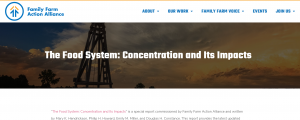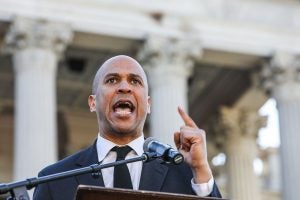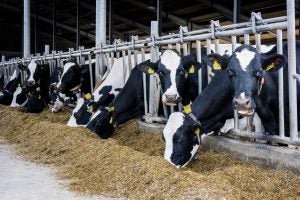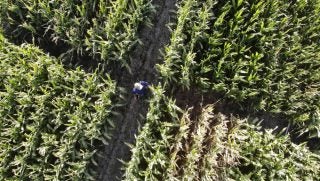A webinar centered on consolidation in the the food system provided a viable discussion, it also failed to suggest any real solutions
A webinar I attended featured an in-depth discussion of the 2020 report titled The Food System: Concentration and Its Impacts. The report, a call to action by the Family Farm Action Alliance, explores the concentration of the American food system and how that impacts consumers, farmers, and farm laborers.
This webinar sounded intriguing on the surface — it could provide an opportunity to learn more about the Family Farm Action Alliance and its goals, and hopefully to see what insights the organization could bring to the table on this topic. After all, the growing monopoly in the agricultural industry is something that has been on my mind, and surely it’s on the minds of other people in this business.
Instead, the webinar offered a consistent drumbeat of: “Our food system in America and the world is broken” and failed to provide any solutions.
The webinar began with Dr. Mary Hendrickson, the author of the Food System report. She talked about the highlights of her report, claiming that our current food system does not allow for equal distribution of wealth and freedom of choice when it comes to putting food on the table.
“The distribution of power in the food system embodied in the power to make decisions about what food is produced, how, where and by whom, as well as who gets to eat,” she said.

She said the consumers are left to navigate a disrupted food supply, deceptive marketing, and limited choices on the grocery shelves. She showed how only a handful of companies — such as JBS, Tyson and Cargill — control most of the nation’s meat supply. Farmers are left to face that consolidation when they try to sell their products, receiving small profits for their hard work. She believes this system and practice allows for existential fragility, where the system must be more resistant.
She also quoted her report, noting that the average herd size of dairy cows increased from 80 to 1,300 head between the years 1987 and 2017. The midpoint of pork sales even rose from 1,200 to 51,300 in that period. Despite the growth in farms and sales, Hendrickson believes the system is still not feeding people. She and her colleagues believe the main driver of the agricultural industry relies on using a scarcity narrative that prioritizes efficiencies over getting products from farm to fork.
“The two things are not connected [feeding people and efficiencies],” she said, “Essentially, this consolidated food industry is not doing what it is supposed to do. … I think we have to reorganize how we think about production and consumption. … We have to think of ways to rebalance power in the food system.”
In both their speech and the report, the authors and webinar leaders did not mention how they would accomplish this. Instead, members of the Family Farm Action Alliance say agricultural professionals should rethink what products should and should not be subsidized.

Eventually, U.S. Senator Cory Booker — who has introduced the Farm System Reform Act with the goal of eliminating the nation’s largest livestock operations — joined the webinar to provide a few remarks. One of his first comments pointed out that farming and ranching, as well as having the ability to own land, is part of the “American Dream.” However, he believes that the American dream is not for everyone unless everyone can obtain it, no matter their circumstances. He believes that the consolidation of corporations is a growing issue. With these issues, he believes these conversations are “utterly vital.”
He did make a good point, saying when the pandemic hit, we saw the food systems’ fragility. Many grocery stores around the country were experiencing meat shortages. The meat market I was working for at the time could not consistently restock the meat case. Customers were outraged with limits to how much they could purchase in a day or in a week.
While that is partially true, I believe this also resulted from warehouse facilities not being able to keep up with demand. Once consumers stopped buying food in significantly large quantities, stores were able to regain their normal capacity. The pandemic created a shortage that was partly the result of unnecessary hoarding of food.
This claim does not stop Booker from reiterating that the food system is fundamentally broken, saying the main driver of the system’s brokenness is corporate consolidation focused on profit rather than getting food on the table. This stance was clear when Booker became the lead sponsor of the FSRA that aims to break up any potential monopolistic practices within the agricultural industry. This resolution received much blowback from farmers and ranchers, some believing this bill would be implementing a socialist action that would set agriculture back 50 years.
Before the webinar went to closing remarks, they had a question-and-answer portion. One of the questions came from a climate reporter from The Washington Post. She asked a question regarding the intersection between supply chain fragility exposed by the pandemic and efforts to reduce food waste as a climate mitigation strategy.
“Have you seen any solutions emerge during the pandemic that might serve as frameworks or role models for a more sustainable ag system?” her question in the chat read. She also asked if there have been specific examples of food getting directly from farmers to those who need it.
Hendrickson replied to this question, saying a shift occurred where we saw that you could get food directly from the farmers. More farmers have been selling their products at farmers’ markets, and she praised the idea of keeping food local.
Another question asked how rescaling the distribution of power should be discussed. Dr. Phil Howard, who took part in the Food System report, shared his thoughts on this question.
“We should stop thinking of capitalism as a mode of consumption but as a mode of power,” he said. “… [We are] talking about people whose sole goal is to increase their power instead of feeding people.”
He said billionaires are exporting meat to China, and they are happy to continue gaining power at everyone else’s expense.
Joe Maxwell, the head of the Family Farm Action Alliance, reinforced Howard’s remark, saying that the agricultural industry’s centralization has led to the decline in the number of dollars in the percentage of the food dollar the farmer receives from their products. He pointed out a correlation that the inflation of cost of food surpassed the actual inflation rate in the United States — all of this amid the fact that the U.S. is recognized as having some of the most affordable food in the world.
I had a couple of questions that I submitted in the chat, but unfortunately, they answered neither. I tried asking if we are trying to discourage regular family farms from expanding past the allowed numbers outlined in the Farm Systems Reform Act. I also wanted to ask about Booker’s credibility for these sponsorships due to his being vegan and having no stake in losing a dietary segment if the animal industry ceased to exist. I wanted to give him a chance to explain his credibility to me as he is developing policies that do not align with many American producers.

Rather than answering my questions, the organizers ended the webinar with closing remarks from the panelists, each saying there must be more discussion on restructuring our food supply chain. Maxwell was able to say the final point, focusing on the subsidies taxpayers buy into each year.
“It is projected that 42 percent of net farm income will come from subsidies this year,” he said. “The current system is not sustainable because shelves are empty during pandemics because workers are put in harm’s way every day. It is what we have to tackle.”
An article Family Farm Action Alliance published on their website underlined a claim that money paid through mandatory checkoff programs go towards “big ag lobbying” efforts. The money funneled to organizations such as the National Cattlemen’s Beef Association and the National Pork Producers Council is used to push for corporate consolidation and recirculated to benefit large corporations through subsidies indirectly, the alliance alleges.
Nevertheless, the claims spread an artificial misconception because the money used for any lobbying comes from fees paid for by these organizations’ members. The NCBA and NPPC receive no checkoff funds for lobbying, though the NPPC is a pure lobbying arm, but both groups are not known for lobbying in favor of agricultural subsidies.
All in all, while the webinar provided a viable discussion, it did not seem to suggest any solutions besides changing the system. The report it was meant to highlight was long and provided extreme claims. However, the discussion lasted only an hour, without going into a deep discussion of the contents of the report. Technical difficulties occurred as well. While issues do happen, some of the time that could have gone towards more discussion were spent figuring out those issues. Furthermore, while the argument is intriguing to indulge in, it is not probative. The report highlighted that the authors were not qualified to suggest policies, but they believe in the pure democratic reconstruction of our food system.
It would have been beneficial to hear more coherent solutions. I have met multiple high schools and college students that have researched and written articles for the World Food Prize, and they came up with more suggestions that could spark solutions, where this report came up with none. While they say they are not qualified to suggest policy, having a potential solution highlighted would have been optimal, other than adopting a vague, new way of thinking.
We want to see farmers operate on independence from large processors and have freedom in their operation to provide for their family and leave a legacy, but are these radical ideas working to accomplish that goal?
Dawson Schmitt is a student at Iowa State University studying Agricultural Communications. He operates a blog called The Heartland Report.


